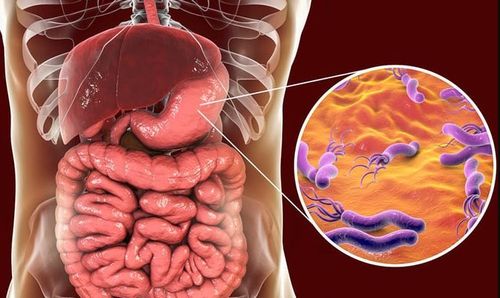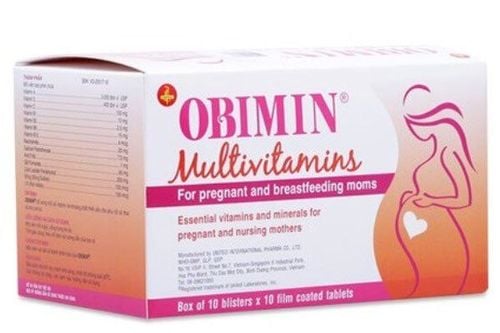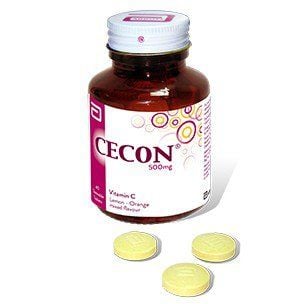The article was professionally consulted by a doctor from the Department of Gastroenterology - Endoscopy, Department of Examination & Internal Medicine - Vinmec Central Park International General Hospital.
Vitamin C has the effect of strengthening health and improving the user's immune system. For people with stomach pain, many people think that they should not take vitamin C to avoid damaging the stomach lining. So can people with stomach pain take vitamin C?
1. Health benefits of vitamin C
Vitamin C (vitamin C or Ascorbic acid) is one of the essential vitamins for the body. Vitamin C is present in many fresh fruits and vegetables. This vitamin plays many roles in the metabolism and function of important organs. The body cannot synthesize vitamin C by itself and must supplement it from foods, tablets, effervescent tablets, injections, etc.
Some effects of vitamin C on humans include:
1.1 Immunity, detoxification
Vitamin C has the ability to support the production of Interferon - a protein produced by body cells (which protects the body from pathogens and is an important component of the immune system).
At the same time, vitamin C also has the ability to reduce the toxicity of drugs, supporting their excretion through urine. Vitamin C deficiency can easily cause immune deficiency, increasing the risk of infection, especially upper respiratory tract infections;

1.2 Collagen production, anti-oxidation
Vitamin C has the function of producing collagen from tropocollagen. Collagen is the main protein component of connective tissue, bones, ligaments, cartilage.
Vitamin C can support vitamin E, antioxidant enzymes such as catalase, glutathione peroxidase, ... to help protect the body against attacks from adverse external factors.
At the same time, this effect of vitamin C also helps the skin to fight free radicals produced by ultraviolet rays, avoid freckles and prevent skin aging, overcome dry hair;
1.3 Synthesis of neurotransmitters
Vitamin C is found in high concentrations in brain tissue and adrenal glands, participating in the production of hormones and neurotransmitters such as Serotonin, Norepinephrine.
At the same time, it also helps the body absorb substances such as calcium, iron, folic acid, helping to prevent anemia;
1.4 Preventing cardiovascular disease
Vitamin C helps improve the strength of blood vessel walls, especially blood vessels that feed the heart.
At the same time, this vitamin also helps fight blood clot formation, prevent atherosclerosis, reduce the risk of embolism and limit high blood pressure;
1.5 Other effects
Preventing osteoarthritis, improving lead poisoning, treating colds, flu and regulating blood cholesterol levels.

2. Can people with stomach pain take vitamin C?
Some patients with stomach pain are concerned about whether or not they should take vitamin C because they are worried that supplementing this vitamin can damage the stomach lining, reduce the pH of gastric juice and make the disease worse.
According to experts, stomach pain is a typical manifestation of digestive tract diseases such as gastroduodenal ulcers, gastroesophageal reflux, Zollinger-Ellison syndrome or Helicobacter pylori infection. Normally, patients with stomach pain need to abstain from certain foods, drinks and certain medications.
However, with vitamin C, patients with stomach pain can completely supplement it daily to improve their health and immunity. With the effect of improving resistance, vitamin C supports the process of inhibiting and eliminating Helicobacter pylori bacteria (the cause of stomach ulcers and stomach cancer) from the body.
At the same time, this vitamin also promotes the regeneration of the gastric mucosa, improves the condition of gastric ulcers, and enhances the ability of the digestive organs to absorb nutrients.
In particular, in practice, vitamin C supplementation with antibiotics and proton pump inhibitors in the treatment of gastric ulcers positive for Helicobacter Pylori bacteria also has the effect of reducing irritation to the gastrointestinal mucosa and minimizing the risk of side effects.

3. What should people with stomach pain pay attention to when supplementing vitamin C?
Users need to pay attention to the fact that excess or lack of vitamin C can cause negative effects on the body. Specifically, a lack of vitamin C will cause a series of diseases that reduce the body's resistance, easily cause infections, slow wound healing, problems with teeth, hair, skin, etc. On the contrary, excess vitamin C in the body can also cause stomach ulcers, duodenal ulcers, diarrhea, increased risk of gout, kidney stones, etc.
Therefore, when supplementing vitamin C, people with stomach pain need to pay attention to the following issues:
Consult your doctor to use vitamin C in the appropriate dosage. Absolutely do not use vitamin C without a doctor's instructions;
Vitamin C can be used in pill, powder or suspension form. So can people with stomach pain take effervescent C? The answer is no. Compared to tablets, when taking effervescent tablets with high vitamin C content, it will increase acidity, causing stomach corrosion. For people with stomach diseases, effervescent tablets can make the disease worse, easily causing ulcers, severe stomach bleeding;
Vitamin C should be taken before or after meals. With powdered vitamin C supplements, users can mix them with juices or soft foods;
Vitamin C should be taken in the morning, not at night to reduce the risk of kidney stones;
Vitamin C supplements can increase the risk of kidney stones, so users need to drink plenty of water, add more green vegetables and go to the toilet when needed to limit the risk of kidney stones;
Do not use high doses of vitamin C for people with glucose-6-phosphate dehydrogenase deficiency, people with a history of kidney stones, hyperoxaluria and oxalate disorders;
Vitamin C is easily soluble in water, cannot be retained in the body. Therefore, vitamin C needs to be supplemented daily;
Using vitamin C can cause side effects such as increased urinary oxalate causing nausea, vomiting, heartburn, abdominal cramps; taking too much vitamin C can cause diarrhea; affecting the central nervous system causing fainting, dizziness, etc.;
Prioritize supplementing vitamin C with foods that are high in vitamin C but do not have a sour taste because they usually do not cause kidney stones or other side effects.

4. Foods rich in vitamin C are good for people with stomach pain
In addition to using vitamin C supplements, users should increase the intake of foods rich in vitamin C in their daily diet.
Some foods rich in vitamin C and not harmful to the stomach include:
Broccoli: 1 bowl of cooked broccoli has about 50mg of vitamin C;
White cauliflower: 1 bowl of white cauliflower contains 40mg of vitamin C;
Guava: 1 guava can supplement 200mg of vitamin C for the body;
Red bell pepper: 1⁄2 bowl of red bell pepper helps supplement up to 95mg of vitamin C;
Potato: 1 baked potato has 20mg of vitamin C;
Kiwi: 1 piece of kiwi has up to 273mg of vitamin C;
Papaya: 100g of papaya has about 90mg of vitamin C;
Strawberries: 152g of strawberries provide 89mg of vitamin C;
Other fruits and vegetables rich in vitamin C: Kohlrabi, cabbage, asparagus, parsley, bitter melon, avocado, lychee, cruciferous vegetables, peas, carrots, mint, etc.
Vitamin C does not irritate the mucous membrane or negatively affect the digestive system. On the contrary, this vitamin has the effect of inhibiting Helicobacter pylori bacteria and supporting the treatment of stomach diseases.
However, overdosing on vitamin C can cause many side effects. Therefore, each person needs to supplement vitamin C properly according to the doctor's recommendations to ensure the effects of this vitamin and prevent unwanted side effects.
To arrange an appointment, please call HOTLINE or make your reservation directly HERE. You may also download the MyVinmec app to schedule appointments faster and manage your reservations more conveniently.













